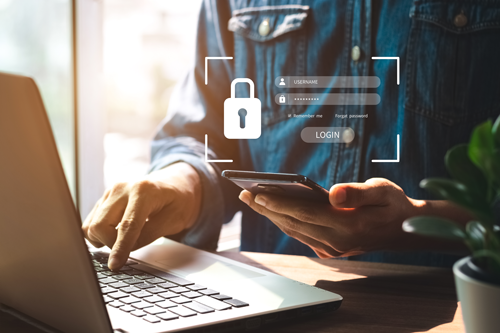Resolutions to lead a better life come fast and furious in the new year, ranging from pledges to lose weight to home improvement projects and efforts to cut down on spending. Yet one area most consumers continue to neglect is online security — despite the fact that cybercrime is on the rise.
The Identity Theft Resource Center reported a record number of data breaches across the U.S. in 2021, and the FBI fielded nearly 850,000 consumer complaints that same year regarding cyberfraud of one kind or another, a 7 percent increase over 2020. The cost of such fraud stretches into the billions. Yet a great deal of the crime online could be prevented if we all took a few simple precautions to protect ourselves. Here are a few tips that won’t take up much of your time but could do wonders for your peace of mind.
1. Strengthen your passwords:
Most people settle for an easy-to-remember password and use it far too often. But passwords that basic are also easy for hackers to crack. You should change passwords often, never use the same one on more than one site, and add length and complexity to discourage the bad guys. (A five-digit password can be defeated in a matter of seconds, while a randomly generated 12-character password might take 4 billion years to crack!) The changeover can be navigated on a password manager, so you don’t have to write them all down on Post-It notes all over your laptop, thereby defeating the point.
2. Avoid phishing holes:
The best password in the world won’t protect you if you carelessly click on links sent by people you don’t know or respond to come-ons designed to elicit personal info or infect your computer with malware. If you receive a suspicious email, don’t respond directly; instead, check with the supposed sender through a phone call or an official website. In addition, you should only download apps from a verified, established site, such as the Google Play Store.
3. Review and adjust your privacy settings:
It’s astonishing how much personal information gets handed over to tracking sites (and hackers and who knows who else) simply because users of Facebook and other social media don’t realize what they are “sharing” with each login. It takes only a few minutes to review the privacy settings on your devices and determine if you’re giving away your location and other personal data to the world at large, only an approved circle of “friends,” or to no one, and adjust your preferences for greater privacy.
4. Be choosey about where you shop:
Making purchases online at an easily hackable site can expose credit card numbers and banking information to thieves, not unlike using an ATM that has a “skimmer” card reader attached to it. Your best bet is to stick to trusted sites that are set up for encrypted transactions, like Amazon. If you’re not entirely comfortable with the site, you can also rely on PayPal or another secure system as a payment option.
5. Stay away from public data dumps:
WiFi networks provided by businesses, airports, libraries and such are a great boon for those who can’t bear to be offline while away from home. But keep in mind that you have no idea who’s snooping while you browse. You should scrupulously avoid sensitive financial or other private exchanges when you’re on a quasi-public network.
6. Consider adding additional layers of security:
While they are not for everybody, virtual private networks (VPN) can provide additional protection and encryption, keeping your private data private. Enabling two-factor authentication on important online accounts, such as banking, employer, and school portals, is another excellent way of keeping strangers from accessing your data.
THE DATA BREACH LAWYERS AT FDAZAR
Frank Azar Car & Truck Accident Lawyers is the largest plaintiff law firm in Colorado, known for championing the rights of individuals who have suffered damages at the hands of large corporations. Over the past 30 years, our attorneys have secured more than $2.3 billion in compensation for our clients. Our class action department is staffed with experienced and knowledgeable attorneys who focus on litigating large, complex cases. If you have suffered damages as a result of unfair business practices, data breaches, or corporate misconduct, the class action attorneys at FDAzar may be able to help. Speak with a member of our class-action team today at 720-372-2824 or contact us here. The consultation is free.



